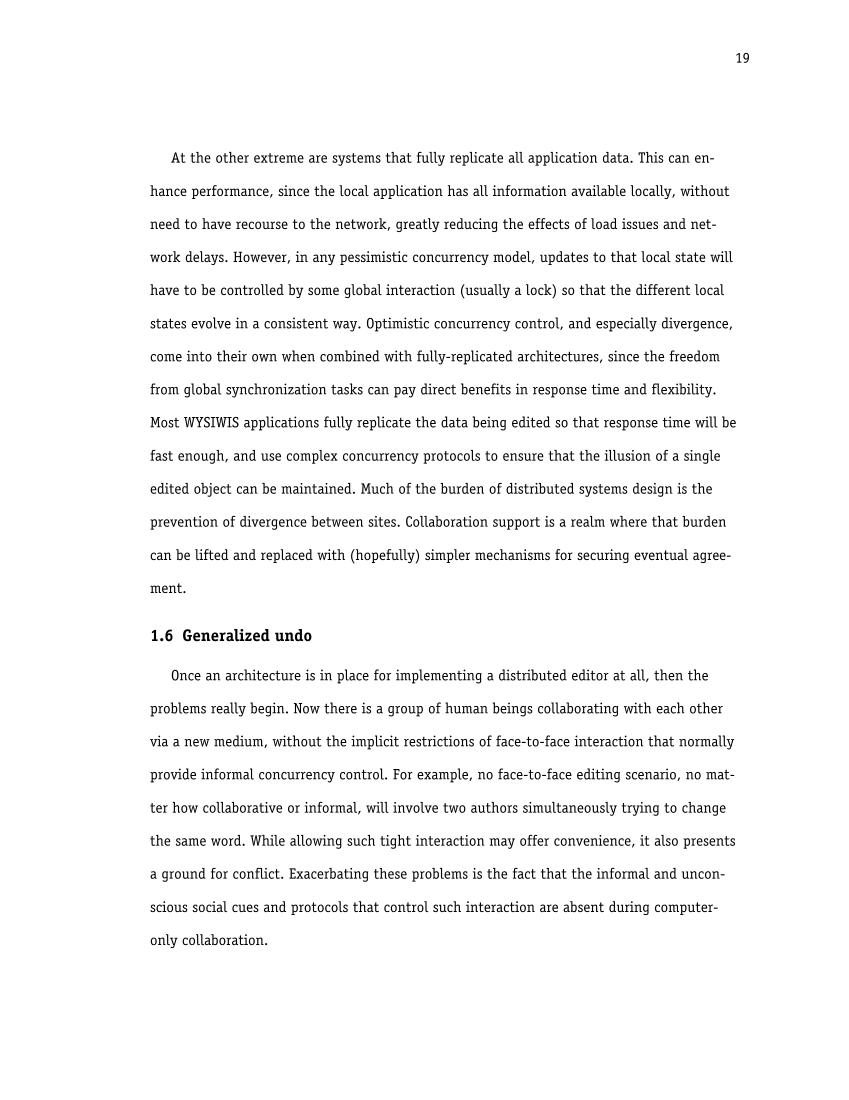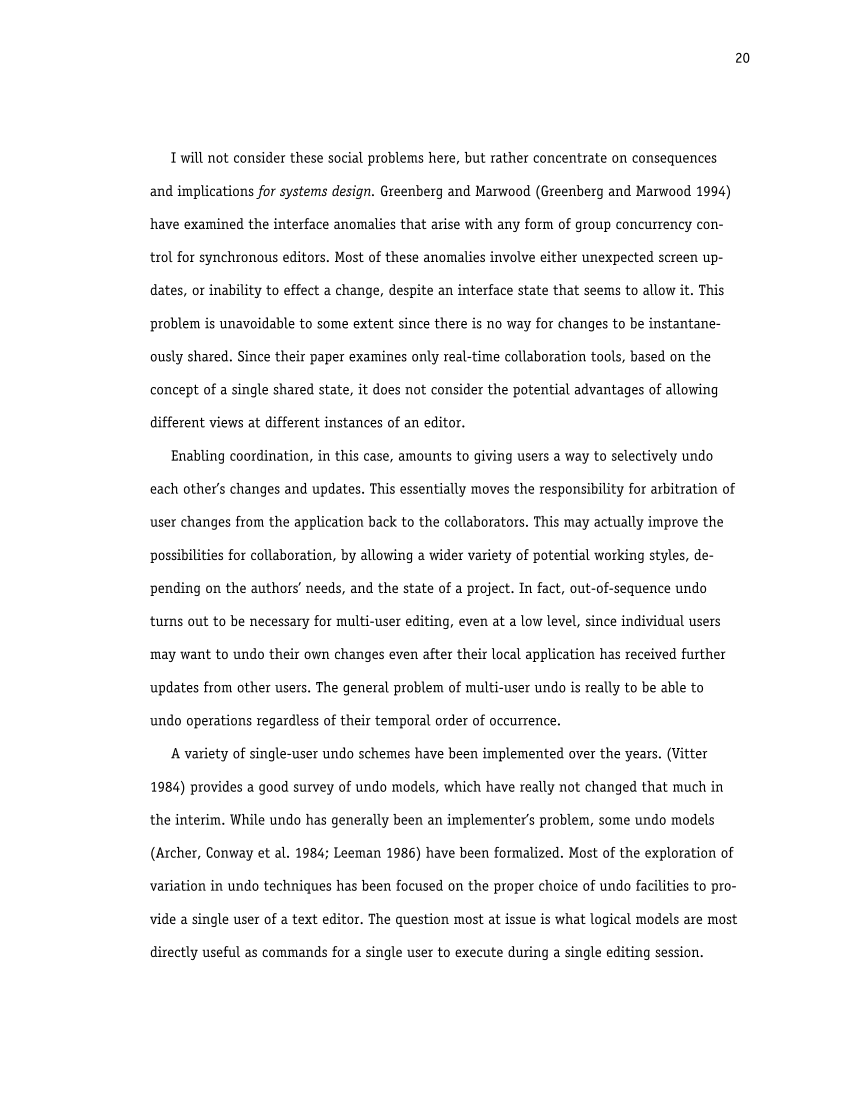19
At�the�other�extreme�are�systems�that�fully�replicate�all�application�data.�This�can�en-
hance�performance,�since�the�local�application�has�all�information�available�locally,�without
need�to�have�recourse�to�the�network,�greatly�reducing�the�effects�of�load�issues�and�net-
work�delays.�However,�in�any�pessimistic�concurrency�model,�updates�to�that�local�state�will
have�to�be�controlled�by�some�global�interaction�(usually�a�lock)�so�that�the�different�local
states�evolve�in�a�consistent�way.�Optimistic�concurrency�control,�and�especially�divergence,
come�into�their�own�when�combined�with�fully-replicated�architectures,�since�the�freedom
from�global�synchronization�tasks�can�pay�direct�benefits�in�response�time�and�flexibility.
Most�WYSIWIS�applications�fully�replicate�the�data�being�edited�so�that�response�time�will�be
fast�enough,�and�use�complex�concurrency�protocols�to�ensure�that�the�illusion�of�a�single
edited�object�can�be�maintained.�Much�of�the�burden�of�distributed�systems�design�is�the
prevention�of�divergence�between�sites.�Collaboration�support�is�a�realm�where�that�burden
can�be�lifted�and�replaced�with�(hopefully)�simpler�mechanisms�for�securing�eventual�agree-
ment.
1.6 Generalized�undo
Once�an�architecture�is�in�place�for�implementing�a�distributed�editor�at�all,�then�the
problems�really�begin.�Now�there�is�a�group�of�human�beings�collaborating�with�each�other
via�a�new�medium,�without�the�implicit�restrictions�of�face-to-face�interaction�that�normally
provide�informal�concurrency�control.�For�example,�no�face-to-face�editing�scenario,�no�mat-
ter�how�collaborative�or�informal,�will�involve�two�authors�simultaneously�trying�to�change
the�same�word.�While�allowing�such�tight�interaction�may�offer�convenience,�it�also�presents
a�ground�for�conflict.�Exacerbating�these�problems�is�the�fact�that�the�informal�and�uncon-
scious�social�cues�and�protocols�that�control�such�interaction�are�absent�during�computer-
only�collaboration.
At�the�other�extreme�are�systems�that�fully�replicate�all�application�data.�This�can�en-
hance�performance,�since�the�local�application�has�all�information�available�locally,�without
need�to�have�recourse�to�the�network,�greatly�reducing�the�effects�of�load�issues�and�net-
work�delays.�However,�in�any�pessimistic�concurrency�model,�updates�to�that�local�state�will
have�to�be�controlled�by�some�global�interaction�(usually�a�lock)�so�that�the�different�local
states�evolve�in�a�consistent�way.�Optimistic�concurrency�control,�and�especially�divergence,
come�into�their�own�when�combined�with�fully-replicated�architectures,�since�the�freedom
from�global�synchronization�tasks�can�pay�direct�benefits�in�response�time�and�flexibility.
Most�WYSIWIS�applications�fully�replicate�the�data�being�edited�so�that�response�time�will�be
fast�enough,�and�use�complex�concurrency�protocols�to�ensure�that�the�illusion�of�a�single
edited�object�can�be�maintained.�Much�of�the�burden�of�distributed�systems�design�is�the
prevention�of�divergence�between�sites.�Collaboration�support�is�a�realm�where�that�burden
can�be�lifted�and�replaced�with�(hopefully)�simpler�mechanisms�for�securing�eventual�agree-
ment.
1.6 Generalized�undo
Once�an�architecture�is�in�place�for�implementing�a�distributed�editor�at�all,�then�the
problems�really�begin.�Now�there�is�a�group�of�human�beings�collaborating�with�each�other
via�a�new�medium,�without�the�implicit�restrictions�of�face-to-face�interaction�that�normally
provide�informal�concurrency�control.�For�example,�no�face-to-face�editing�scenario,�no�mat-
ter�how�collaborative�or�informal,�will�involve�two�authors�simultaneously�trying�to�change
the�same�word.�While�allowing�such�tight�interaction�may�offer�convenience,�it�also�presents
a�ground�for�conflict.�Exacerbating�these�problems�is�the�fact�that�the�informal�and�uncon-
scious�social�cues�and�protocols�that�control�such�interaction�are�absent�during�computer-
only�collaboration.





























































































































































































